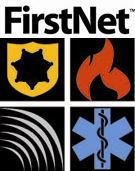 On August 8, 2016, I’ll become an employee of the First Responder Network Authority – FirstNet. FirstNet is the federal government agency charged by Congress in 2012 to build a 4th Generation LTE wireless network nationwide with priority for those who respond to public safety incidents and disasters. I’ve sometimes called this mission “smart phones and tablet computers for cops and firefighters”.
On August 8, 2016, I’ll become an employee of the First Responder Network Authority – FirstNet. FirstNet is the federal government agency charged by Congress in 2012 to build a 4th Generation LTE wireless network nationwide with priority for those who respond to public safety incidents and disasters. I’ve sometimes called this mission “smart phones and tablet computers for cops and firefighters”.
“The federal government” conjures visions of vast unfeeling bureaucracy, giant buildings with endless cubicles, and waste of taxpayer money. Perhaps some federal agencies are like that. But also consider this: federal government employees are National Park Rangers, NASA scientists and astronauts, people who efficiently deliver the mail, serve in our Coast Guard and other armed services, and fight the wild fires which ravage National Forests. And some agencies are very innovative, like the United States Digital Service and the lean startup 18F.
FirstNet is such an agency.
It is relatively new. It has a solid focused mission to support the safety of 324 million Americans through wireless technology. It has taken an innovative approach to finding a private company partner to build the network which might be worth $100 billion over 25 years.
FirstNet has had its struggles. I’ve been one of its most public critics. I’ve blogged “Is FirstNet Stalled” in February, 2015, at which time three years had passed with little progress and about FirstNet’s Scandal and Resurrection in 2014. I’ve suggested FirstNet might become the next healthcare.gov when it appeared to be mired in federal bureaucracy outside its control.
But I’ve also been supportive of the times FirstNet has taken bold, innovative action, such as the appointment of Sue Swenson as Chair of the Board and T J Kennedy as President. I’ve made numerous suggestions of how FirstNet might significantly improve response to public safety incidents such using voice technologies like Amazon Echo, improving transportation (“The Internet of Speeding, Parking Things”) and improving the safety of first responders (“The Internet of First Responder Things”).
FirstNet has now charted and is following the road to a complete success. With at least three bidders to build our network, and support from major telecommunications companies with extensive existing networks, FirstNet might be a reality in 2018.
In fact, the most significant issue FirstNet probably faces is getting agencies to adopt and use the new network. Many large agencies are cautiously supportive today, but rightly want FirstNet and its vendor partner to “show us the beef” – a solid working network with coverage equal to or better than existing networks, and a cost equal to or less than existing networks, with an array of new features and functionality (see my blog here for what that “array” might be).
And that is why I’m coming on board: to help FirstNet build a set of services and functions which public safety agencies need, and to convince those agencies to come on board.
I’ve seen the mess created when thousands of agencies each build their own voice radio networks, and then have to make them interoperate. With FirstNet, we can build a nationwide data and cellular network from the beginning, and with every agency on board, have solid interoperability. We can have firefighters from multiple agencies rushing to the scene of a major urban fire or huge wildfire, and see their actions coordinated with situational awareness and mapping. We can have dozens of law enforcement agencies – local, state, federal, tribal – cooperate on investigations or raids on drug smugglers and terrorists, all using common apps. We will find paramedics interacting with hospitals and private physicians and healthcare records to deliver top-quality urgent care in remote locations.
That is IF FirstNet offers innovative features and apps, and IF agencies sign up to use it.
We’ve seen multiple waves of innovation which have vastly changed our personal and public lives:
- The telephone
- Radio
- Television
- The Personal Computer
- The Internet
- The World Wide Web
- Smart phones and apps
- Tablet computers
I want to help add “FirstNet” to that list.
FirstNet has received a lot of Presidential and Congressional support. More importantly, it was born from the support of thousands of public safety agencies through their successful effort to see wireless spectrum (the “D” Block) allocated for first responder use. Hundreds of thousands of stakeholders in 55 states and territories have attended a lot of meetings and heard a lot of discussion about the potential of a nationwide public safety wireless broadband network.
For the sake of the nation, for the sake of first responders and all responders, FirstNet damned well better deliver on its promises.
I’m joining FirstNet to help it do just that.





You will add much to FN as it weaves together a strong p/s BB network. I know ur communications w/ colleagues will remain strong and enhance FirstNet’s. Congratulations to you and to FN for making a great choice.
Congratulations, Bill!
Is the plan for achieving all this interoperability to use open standards? The alternative seems to be for us to select a proprietary system that would result in the details of our public infrastructure being tied up in trade secrets, copyright restrictions, and licensing agreements, with the ability for the people to use and maintain our FirstNet network contingent upon the whims of one or more for-profit private entities.
Mobile network operators have a history of lock-in, poor network security, and lagging updates to software on increasingly-vulnerable handsets. If those mega-corporations are provided with much influence into the creation of this system, we’re likely to end up in a worse situation than the current one, with no choice as technology advances and as adversaries become more sophisticated but to either scrap the whole thing and start over or pay whatever price those private entities demand from us.
Let’s not repeat our mistakes. The Internet, built on open standards and free software, is a wild success, with interoperability by design. Ditto for good ‘ole FM radio. We secure our online banking transactions, private health information, and other private communications with technologies like TLS and PGP that are secure because we know how they work. Motorola Smartnet? Verizon Wireless? Not so much.
Hi Phil and thanks for the kind words. Sorry I didn’t get to chat with you when we had that meeting yesterday.
Yes, FirstNet will use LTE – long-term evolution, which is an international standard for wireless networking managed by the almost entirely commercially driven 3GPP. This is exactly the opposite of many land-mobile radio systems in use today, which are either proprietary or have a number of proprietary features.
That said, neither LTE nor FirstNet are “open” in the sense of the Internet. The Internet is also the vehicle for most of the nasty cybersecurity threats we see today. Cybersecurity is “job one” for FirstNet.
Your comment inspired me to write another blog, which I’ll get started on right now!
-bill
So, is it your expectation that anyone with sufficient tooling could build a handset that is compatible with FirstNet? No licensing or granting of permission to implement the specifications will be required? Hobbyists will be able to build devices from kits (or write programs for software-defined radio devices) to listen in on unencrypted channels used by our public servants? One jurisdiction might purchase devices from Qualarola, and another might take an open-source hardware design to a factory in Shenzhen and have hardware built for them, and they’ll all be interoperable?
Will the public own the infrastructure (e.g., cellular towers, backhaul networks, etc.) or will we be forced to do business with private entities at whatever cost they demand in order for our staff to communicate on our new public safety network?
Regarding the Internet: If by “cybersecurity” you mean computer network security, then yes, of course, the biggest computer network in the world can be considered to be the “vehicle for most of the nasty cybersecurity threats we see today.” That is not because the Internet is built on open standards; it is because computer networks are where computer network security breaches occur. Similarly, streets, sidewalks, doors, and windows are the vehicles for most of the nasty burglary threats we see.
FirstNet will be more secure than existing cell networks, Phil. That means it will be less open. Certainly hobbyists will NOT be able to build devices from kits to operate on FirstNet. That would render the network extraordinarily vulnerable to hackers and jammers. That said, you make a good point about the need to keep some public safety dispatch channels/operations “open” to listen-only by the public, just as they are now. I had not thought about that aspect, and will work on it.
-bill
Bill, you seem to be dodging questions about whether this network will be constructed on open standards or be created and maintained only at the pleasure of private entities. Is the technology upon which FirstNet will be built open to the public, or tied up in proprietary protocols and licensing schemes? Will the towers and networks be owned by the public or by private entities?
Your experience, knowledge, and enthusiasm will be an asset to the FirstNet Team. Congratulations
Congratulations Bill! Godspeed!
Congratulations to you – and FirstNet. No words can express the level of appreciation we all have for your contributions to public safety and those with whom you work. If your contributions to FirstNet are only one-half of what you’ve done for OneNet here in (the other) Washington, FirstNet will most certainly become a reality! I look forward to our continued relationship (and having someone on the “inside”). Best to you always – MMM
Congratulations Bill !
Like you, I was a contributor to the NPSBN with PSCR back in 2008 or so and in 2010 was nearly impossible to get me off of the ‘soapbox’,trying my damnedest to get everyone in public safety onboard to support to request the ‘other’ 10 mhz of block D.
I was astonished to learn that less than 10% of the people I spoke to (in public safety) about NPSBN even had a clue of what I was supporting. When I spoke of block ‘D’ ,some may have thought I was talking about a zoning issue!
It’s great to know that we’ll have such a knowledgeable resource within FirstNet.
I’ll talk about my concern about access to the floor controller another time.
Best of Luck to you in your new endeavor!
Randy K.
Thanks for the comments, Randy. I agree with your statements – both the NPSBN and FirstNet are very well known. Indeed, I still meet people who, if knowledgeable about the efforts at all, will look at me and ask “you mean the D block”? That effort had good branding!
-bill
Thank you Michael, David, Victoria and Brad! I look forward to continuing to work with you on this great project.
-bill
Congrats Bill, hoping you the best but please don’t get swallowed up by the layers and levels of FN or how the bidders that have responded will get FN up and running by 2018. And hopefully most of the states involved will step up and “buy” in to FN. The PS community depends on communications that work in real time not in “we almost got it right time”,
Hey John, good advice. My biggest single concern is continuing to make an impact – and I think FirstNet is still small and nimble enough to do that. We’ll see. Love your comment “real time, not “almost””!
-bill
Bill
Have been following FN and noticed a change in direction and seeing the bidding war’s beginning and see the states pushing back, haven’t seen your thoughts lately, keep up the good fight my friend.
John
It’s about time! Darryl and I always thought you’d be perfect for it.
Thanks Kelly!
Congratulations Bill, -rb
What a great selection they have made in you. I can’t wait to read all the innovative things you’ll be working towards…all in the name of moving public safety communications forward. Your knowledge and ‘get it done’ attitude will definitely be missed here in moving Washington State forward, but I know you’ll be successful in this new venture – just as you have been in all the other tasks you’ve taken on. And maybe now you can work just ‘ONE’ job sir. Have a wonderful first day at First Net!
Thanks, Peggy. You are setting the bar high here “all the innovative things”. I hope we can advance just a few. And yes, just one job for a change!
-bill
Congratulations Bill.
I have thought for a long time that you would be a major asset for FirstNet.
Best Wishes,
Thank you Steve! Hope we can stay in touch on this and other interoperability issues.
-bill
Pingback: Get Over It, Already | the Chief Seattle Geek blog